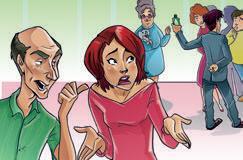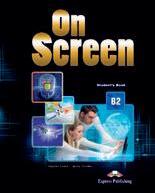
People





M ODULE O BJECTIVES
▶ Vocabulary
• appearance/character/ clothes
• personality
• jobs
• daily routines, free time activities
• prepositions
• phrasal verbs: look
• word formation: adjectives from verbs & nouns
▶ Reading
• multiple choice
• answer questions
▶ Grammar
• present tenses
• stative verbs
▶ Listening
• a radio interview (true/false statements)
• a part of a TV show (multiple choice)
• intonation: stressed syllables
▶ Speaking
• introduce ourselves/others
• ask about/express likes/ dislikes
• ask for/give personal information
• social expressions
• describe a picture
• describe a person
▶ Writing
• a paragraph comparing your lifestyle to a tribe’s lifestyle
• an informal email describing a person
▶ Language Focus
• phrasal verbs & prepositions
• word formation
• grammar in focus
▶ Progress Check
Complete the descriptions. 1






•spiky •beard •polite •early •dark •overweight •casual •optimistic •fair •trainers •shoulder-length
Becky is a pretty girl. She is slim with 1) ..................... dark hair. She has a 2).................... complexion, a small nose and blue eyes. She is wearing a pink T-shirt, jeans and 3) ............... . She is sporty and 4) ................... and tends to expect good things to happen.
•wrinkles
•jumper
•caring
•medium
•bald
•skinny

2
Steve is in his 1) ...................... thirties. He is tall and 2) ...................... with short 3) ..................black hair. He has a 4) ...............complexion, a big nose, a 5) ..................and a moustache. He is wearing 6) .................clothes, a white T-shirt and jeans. He is a very 7) .........................person and behaves towards people in a pleasant way.
Larry is old and of 1) ............................ height. He is 2) ........................... and has a pale complexion with 3) ........................ . He is going 4) ...........................
His hair is grey and he has a big nose. He is wearing a 5) .......................................... and trousers. He is a 6) .......................... person and always helps others.
Use the words/phrases below to describe the rest of the people in Ex.1.
• teenager, tall, slim, pale complexion, long straight fair hair, big eyes, pointed nose / striped top, jacket, jeans / outgoing –like meeting people
• handsome, slim, short, dark hair, brown eyes / shirt and tie, black leather jacket, trousers / can be arrogant –thinks he is better than others
• mid-forties, average height, slim, curly fair hair, small eyes, thin lips / cardigan, shirt, trousers / gentle –always kind and calm

Describe a person in your class. Your partner guesses who the person is. 3


1

a) Look at the picture. Where do you think these people live: inadesert? an overcrowded city? avillage? up in the mountains? How do you know? What do you think their lifestyles might be like?
b) Check these words in the Word List. Use them to describe the people in the picture.
•fairly short •dark in complexion
•colourfully embroidered black shirts and skirts •thick black leggings
•distinctive hats •remarkably tough •spirited •cheerful


2 In your own words and based on the text, answer the questions.
Read the title of the text and the first sentence in each paragraph. What is the text about?
Listen and read to check.
1 What is the Akha Way?
2 How do Akha men’s roles differ from Akha women’s roles?
3 What are the ‘spirit gates’?
4 How has the Akha people’s lifestyle changed?
High up in the mountains of southeast Asia, you can find the Akha hill tribes living in their traditional villages and farming the land much as they have done for generations.
The history of the Akha people goes back hundreds, if not thousands, of years. They originally came from Tibet and have maintained the physical characteristics of that region, being fairly short and dark in complexion. Today, they live in small villages in the mountainous parts of China, Laos, Burma, Vietnam and northern Thailand. The Akha people are rich in culture, history and tradition. But they are also among the world’s poorest people. Akha women remain remarkably tough, spirited and cheerful in the face of such a harsh life. Akha men are brave and strong.
The Akha have their own way of measuring time where one week lasts 12 days; as well as their own sets of rules. Each village has its own leader or headman, and under his guidance people follow a code of behaviour known as the Akha Way. Thanks to the Akha Way, each person in these small communities knows their role in society.
The men provide for their families by farming crops like rice, corn and soya beans. They are also talented craftsmen and make crossbows, baskets and musical instruments from bamboo. The women do spinning and weaving and make their own
Check these words
•generations •maintain •mountainous parts •code of behaviour •crossbows •ancestors •spinning •weaving •distinctive •thatched roof •stand on stilts •wooden frame •spiritual significance •honour •take things a step further •seek fortunes

clothes. They wear colourfully embroidered black shirts and skirts, and thick black leggings. Their headdresses are especially distinctive. As for the children, even though many of them don’t attend school, they all know the names of every plant and animal in the forest. There is no written Akha language but the oral tradition is very rich. Children have to memorise the names of all their ancestors, sometimes as far back as 60 generations!
Akha villages all look quite similar. The bamboo houses with their thatched roofs stand on stilts on the hillsides. Every village has two wooden frames that look like a doorway at its entrance and exit. These structures have spiritual significance and are called the ‘spirit gates’. Artists cover the frames with carvings of both evil and smiling faces. This is to invite good spirits to enter the village and keep bad spirits out. Each summer, with great ceremony, the men build a swing in a public open space. Here the young children gather to play, but not just as a playground game –it is part of the yearly ceremony to honour dead ancestors.
Sadly, the Akha Way is slowly disappearing from many villages. A growing number of tourists are visiting them and introducing a taste of Western culture. You can now see young Akha tribesmen sporting leather jackets and mobile phones. The women and girls only dress traditionally when there are tourists around in the hope they will buy souvenirs. Some Akha have even decided to take things a step further: they are leaving their villages to seek their fortunes in the big cities.
Read the text quickly to get the gist. Read the questions and possible answers and find the key words. Read the text again and find the part that contains the answer to each question. Try to find words/phrases synonymous to the key words in the questions. This will help you do the task.




Choose the best answers according to the text. Give reasons for your answers.
1 The Akha people
A live mainly on Tibetan farms.
B are not used to severe conditions.
C have a short history as a tribe.
D are some of the least wealthy in the world.
2 Akha women
A are used to dealing with hardships.
B do not mind being poor.
C work harder than Akha men.
D are more courageous than Akha men.
3 The most characteristic part of the Akha women’s clothing is their
A shirts. B skirts. C leggings. D hats.
4 The Akha build spirit gates on the edges of their villages to
A welcome visitors to the village.
B give artists a place to work.
C protect the village from danger.
D provide a play area for their children.
5 The writer thinks that the Akha Way
A is having an influence on Western culture.
B may not be around for much longer.
C is now only noticeable in the Akha people’s clothes.
D could take a long time to spread to cities.


Find words in the text that mean:
•initially (para A) •skin colour (para A)
•characteristic (paraB)
•to learn by heart (para B)
•importance (paraC)
•to come together (paraC)
•to bring in (paraD) •to look for (paraD)

Fill in: set, embroidered, attend, fairly, talented, memorise, physical, honour, keep, thatched.
1 ................ characteristics; 2 ................ short; 3 ................ of rules; 4 ................ craftsmen; 5 ................ shirts; 6 to ................ names; 7 to ................ school; 8 ................ roofs; 9 to ................ spirits out; 10 to ................ ancestors


Use the phrases in Ex.6 to give the class a short summary of the text.
Compare yourself with a person from the Akha tribe. Think about: appearance, clothes, family, lifestyle. Use: and, as well, too (similar ideas) – but, whereas (opposing ideas). Read your paragraph to the class.

Vocabulary from the text

1
Replace the words in bold with words from the list.
•leadership •a step further •attend •honour •gather •maintain •introduce •memorise
1 He tries to keep a youthful physical appearance.
2 They get together at Sam’s house every Friday.
3 We have to learn the poem by heart for school tomorrow.
4 I think every child should go to kindergarten.
5 Under the new manager’s guidance , the company went from strength to strength.
6 Every year, they have a ceremony to show their respect to their ancestors.
7 I think the time has come for us to take things forward
8 If we bring in modern cultural practices to the tribe, we’ll destroy their traditional way of life.

Choose the correct word.
1 We have a code/law of behaviour here. Please respect it.

Topic vocabulary Clothes
Steve is wearing 1) formal/casual clothes. He’s wearing a brown 2) jacket/coat , a blue and red 3) cotton/plastic cap, a yellow woollen 4) jumper/waistcoat and an orange 5) scarf/belt . He’s also wearing grey 6) baggy/ floral tracksuit bottoms and brown 7) trainers/boots . He looks quite 8) conservative/trendy and sporty.
Mary is wearing a white dress with black 9) polka dots/stripes , and a red 10) leather/ cotton belt. She’s also wearing red 11) highheeled/platform shoes. She looks 12) fashionable/sloppy
4

Describe what the people in the pictures are wearing. Use words from Ex.3 as well as your own ideas.




8 She has very individual/ distinctive eyes – the colour is unlike anything I’ve ever seen. 2
2 Everyone has a responsibility in society/region to obey the laws.
3 We should all try to help maintain our local community/society
4 My ancestors/descendants all came from Europe.
5 Sadly, many of the tribe’s traditional practices are disappearing/removing
6 It’s important to remain/hold calm during an argument.
7 I am a lightly/fairly optimistic person.

Choose the correct words. 3 Fill in: try on, match, fit, suits, doup

These jeans don’t .............. me. They are the wrong size.
Can I please .............. this coat? 3 I’m looking for a pair of shoes to .............. this dress. 4 Do you think this colour .............. me?
.............. your coat. It’s very cold outside.
Phrasal verbs: LOOK

6
Choose the correct particle. Check in the Word List. 1 I’m looking ..................... my little cousin this weekend. (take care of)
down on after up forward up to for look
2 We can’t wait to meet your parents. We’re looking ..................... to it. (anticipate)
3 You shouldn’t look ..................... people who have less money than you. (have a bad opinion of)
4 If you don’t know his phone number, just look it ..................... in the yellow pages. (find in a book/list)


a) Match the adjectives in A with their opposites in B.

9
b) Choose words from Ex. 7a to complete the sentences.
1 ................... people always see the positive side of things.
2 ............................. people don’t like talking about their achievements.
3 ............................. people are kind and calm.
4 ............................. people tell a lot of lies.
5 ............................. people think they are more important or talented than others.
6 ............................. people often become sad or angry for no particular reason.
7 ............................. people always want to start fights.
8 ................... people are helpful and sympathetic to others.
9 ............................. people only care about themselves and not others.
10 ............................. people get easily annoyed when they have to wait for something.
c) Which adjectives best describe you/your friends?
I’m quite organised and polite.

Add a suffix to the verbs in the list to make names of jobs. Match the jobs to the descriptions (1-10).

Choose the correct item. Check in the Word List.
1 She’s attached in/to her family.
2 He is jealous of/about his brother for being good at sports.
3 He is interested in/at nature.
4 I don’t really care of/about designer clothes.
5 Don’t be rude to/with your teachers.
Word formation (adjectives from verbs & nouns)
Read the theory, then complete the sentences (1-8) with the adjectives derived from the words in bold.
We can form adjectives from verbs and nouns by using the following endings: -ful (care-careful), -ic (dramadramatic), -ive (decide-decisive), -ious (superstitionsuperstitious) , -less (selfselfless), -ish (child-childish), -y (pick-picky), -ing (care-caring)
1 John is very ........................ . He never remembers where his things are. (FORGET)
2 Luke is ........................ . I think he’ll become a painter. (CREATE)
3 He’s very ........................ . He wants to become rich and famous. (AMBITION)
1 I change written words from one language into another. translator
2 I work underground to remove coal.
3 I play roles in films.
4 I keep and check the financial records of people.
5 I grow crops and keep animals.
6 I fix problems with electrical wires.
7 I use make-up to improve people’s appearances.
8 I make bread and cakes and sell them in a shop.
9 I tidy other people’s houses.
10 I play the piano very well.
4 Ann’s ........................ . She’s always talking about the same things. (BORE)
5 Don’t be ........................ . Think of others first. (SELF)
6 He’s very ........................ . He tells the best jokes. (FUN)
7 Sue’s quite ........................ . She’s very good at drawing. (ART)
8 Jess is ........................ and often offends people. (TACT)


Ladies and gentlemen, thisspecial potion comes fromthe Amazon. It makes you look younger and livelonger!


Hmm. That sounds good. I’m getting married next month. I want to look much younger on my wedding day.



Look at me! I’m standing here today, a handsome young man – but I’m really over 200 years old!
His secret is simple –he drinks a bottle of this potion every day.
Is he really 200 years old or is he kidding us?


I honestly don’t know. I think he’sgrowing old slowly. I’ve only been with him for 150 years. Present simple, present continuous, present perfect see p p. GR1 –GR2

a) Read the cartoon. What is the man selling? What is special about it?
b) Look at the verb forms in bold in the cartoon. Find examples of:
•a habit •an action happening at or around the time of speaking •a fact •a fixed future arrangement •an action which started in the past and continues to the present •gradually developing situations
What tense is used in each case? Is it the same in your language?

2
a) Fill in: do, go or have.
1) ............ out for a meal; 2) ............ the washingup; 3) ............ a shower/a bath; 4) ............ for a walk; 5) ............... to work/ school; 6) ............... housework; 7) ............ breakfast/lunch/dinner; 8) ............... shopping; 9) ............... homework; 10) ............ jogging; 11) ............ out with friends; 12) ............ for a swim; 13) ............ the shopping; 14) ............ to the cinema; 15) ............ to bed
b) Use the question words in the box to find out about your partner’s daily routine and free-time activities.
•How often ...?
•When ...?
•Where ...? •What time ...? •How ...?
A: How often do you go out for a meal?
B: Once a week./Twice a month.

3
Read the example. Which tense do we use for: timetables? future arrangements? Use the notes to act out short exchanges.

A: What time does the film start?
B: It starts at 9:0 0, so we are meeting at 8:00. FILM 9:00 –10:50 MEET AT 8:00 TOUR 6:00 - 7:00 LEAVE 5:15

Form complete sentences. Put the verbs in bold in the present simple or the present continuous.
1 do /she/at the moment/her homework She is doing her homework at the moment.
2 usually/ go /by bus/he/to work
3 dinner/tonight/I/with Paul/ have !
4 eatout /you/how often?
5 not work /tonight/late/Peter
6 the kids/now/ watch TV?
7 on Mondays/to the gym/John/ not go



Stative verbs describe a state rather than an action (e.g. like, love, hate, want, need, forget, remember, know, suppose). They do not usually have continuous forms. Some stative verbs do have continuous forms but there is a difference in meaning. I like wearing casual clothes.
see p.GR2

Put the verbs in brackets into the present simple or continuous. Explain the meaning of both sentences in each pair.
1 a Linda ........................ unhappy. (look)
b Linda ..................... for her necklace. (look)
2 a Tina ........................ unwell today. (feel)
b Tina’s silk scarf ............. very soft. (feel)
3 a Tom ........................ his own flat. (have)
b Tom .................... a shower now. (have)
4 a I ....................... of buying a bike. (think)
b I ........................ it’sfantastic. (think)
5 a This cake .................... delicious. (taste)
b She........................ the soup to see if it’s spicy. (taste)


1 I’ve already had lunch.
2 I haven’t done my homework yet.
3 I’vejusthad a coffee.
4 A: Have you ever played the trumpet?
B:No, I haven’t./Yes, I have.
5 I’ve never travelled abroad.
6 I’ve been here since last May/for two months.

Choose the correct word.
1 She’s never/already flown in a plane.
2 They’ve just/yet left.
3 He hasn’t finished his homework yet/ever
4 Have you never/ever ridden a camel?
5 We have yet/already met Claire.
6 She hasn’t seen Paul since/for last Friday.

Think of your day. What have you already/ just/not yet done? Tell your partner.
I’ve already done my homework. I’ve just had dinner. I haven’t tidied my room yet
Present perfect continuous

She has been working for him for a long time She has been working for him since 1992.


Read the examples in the grammar box. How do we form the present perfect continuous?

Use the verbs in the present perfect continuous to write true sentences about yourself and your family. Use since or for. •study •work •play •live
I’ve been studying French for two years/since 2009.

Put the verbs in brackets into the correct present tense.
1 A: (you/see) Mary recently?
B:No, I (not/talk) to her since last month.
2 A: (we/meet) before?
B:I ....................................... (not/think) so.
3 A:Where (you/go) ?
B:Shopping. (you/want) anything?
4 A:Where (Tony/live) ?
B:In London – but at the moment he (stay) in Bahrain.
5 A: (you/come) to Ann’s party tonight?
B:I’d love to, but I (fly) to London. The plane (leave) at 10:30.

Dear Charlotte, Hi! How are you? 1) ....................................... (you/enjoy) the summer break? I 2) ......................... (have) an amazing time here in London. My host family 3) ......................... (be) really friendly and the summer English course I 4) ......................... (do), is a lot of fun. I 5) ..................... ....................... (already/make) some good friends here. My best friend is Laura. She’s from Italy. She 6) ........................ (look) a bit like you actually. She’s tall, with beautiful long dark hair and big brown eyes. Like me, she 7) ..................... (be) in London since July. I 8) ....................... (like) her because she’s funny and cheerful. She’s also very generous. 9) ................................ (you/meet) anyone nice so far? Write back soon! Alice


a) Complete the pairs. Listen and check. 1
1 granddad –grandma

b) Use words from Ex.1a to present your family to the class.
There are four members in my family. My dad, Peter, my mum, Laura, my sister, Sue and me. My dad is ...



a) You are going to listen to a part of a radio interview about a young ballerina. Before you listen check these words in the Word List.
•hometown •treasure the time •extended family •delighted •support •inspiration •afford •lead role •venue
b) Listen and write how the people below are related to Jane Ivory.
3 Peter Jenny Sandra Bertie

Listen again and decide if each sentence is True or False.
1 Jane Ivory has been performing as a ballerina for 24 years.
2 Jane’s brother still lives in his hometown.
3 Jane’s aunt now runs her own school.
4 Jane’s grandpa gave her financial assistance.
5 Jane has performed in Swan Lake before.
6 Jane seems to be worried about her role.

Work in pairs. Write down the names of three people you know. Exchange papers and find out about each person.
A: Who’s James?
B: He’s my cousin.
A: What does he look like?
B: He’s short and slim, with short fair hair and blue eyes.
A: What is he like?
B: He’s honest and polite.
Before you listen, read the rubric, the statements and possible answers. This will help you familiarise yourself with what the recording will be about.
5

a) Read the rubric, statements and answers. What do you think the dialogue is about?
Listen to a part of a TV show. For questions 1-6 choose the correct answer A, B or C.
1 The TV show is about
A British chat shows.
B the life and times of a TV personality.
C the history of British TV.
2 James first met Anna A in London. B in Paris.
C at a rugby match.
3 James describes Anna as A a difficult person to be around.
B someone with a positive view of life.
C a talkative person.
4 The interest James and Anna share is A going to the cinema.
B watching TV.
C watching classic films.
5 When James’s daughter was born
A James resigned from work.
B James spent most of his time at home.
C James was beginning a new career.
6 James’s daughter, Laura, A is employed as a fashion designer.
B has not started working yet.
C has chosen the same career as her father.
b) Check these words in the Word List. •chat-show host •incredible •bright •demanding •resign •degree •confident
c) Do the listening task in Ex.5a.

6
Listen and say. Which syllables are stressed?
•talented •generous •optimistic •modest •understanding •confident •energetic
Introduce ourselves/others –Ask for/Give personal information –Ask about/Express likes/dislikes

•name’s •prefer •pleasure •like you •met before •you from 1
a) Complete the conversation with words from the table below.
•favourite band •stand •love

Juliet:Hello. I don’t think we’ve 1) I’m Juliet.
Dan:Hi Juliet. My 2) ........................ Dan.
Juliet:It’s a 3) ...................... to meet you, Dan.
Dan:Nice to meet you, too. Where are 4) ............................. ?
Juliet:I’m from London. And you?
Dan:I’m from Glasgow. So, are you enjoying the party?
Juliet:Well, to be honest, I can’t 5) the music. I don’t like dance music at all.
Dan:I know what you mean. I 6) rock music.
Juliet:Really? What’s your 7) ........................... ?
Dan:I really love Radiohead. They’re great!
Juliet:Oh, Dan, I’d 8) .................. to meet Sasha.
Dan:Hi Sasha. Do you and Juliet work together?
Sasha:No, we play on the same football team.
Dan:Really? I 9) ........................ football!
Juliet:You should play with us some time then!


2
b) Listen and check your answers. Is the dialogue formal or informal? Give reasons.
c) Take roles and read the dialogue aloud.
Work in groups of three. You and your cousin are at a party. Introduce yourself and your cousin to a person there, then ask questions to get to know the person better. Use the phrases in the table below to act out a dialogue similar to the one in Ex.1a.
Introducing yourself/others Responding
• Hello. I’m … ./My name’s … .
• I don’t think we’ve met before. I’m … .
• I’d like you to meet … ./ This is … .
• Nice to meet you.
• It’s a pleasure to meet you.
Asking about likes/dislikes Expressing likes/dislikes
• What kind of music/films do you like?
• Do you like …?
• What do you think of …?
• What’s your favourite subject/band, etc?
• I really enjoy/ like/love+noun
• I can’t stand … .
• I don’t mind … .
• I prefer … .
Asking about personal information Responding
• Where are you from?
• Which school do you go to?
Social expressions

3
• I’m from … .
• I go to … .
Match the exchanges. Listen and check. Repeat the phrases in pairs.
Have a nice weekend. Come on –we must go. How are things? Goodnight. Sorry I’m late. Bye. I’m off to the gymnow.
Describing a picture

4
a Fine, thanks.
b Take care. See you later.
c Sleep well.
d Just a minute.
e Never mind. You’re here now.
f Thanks, you too.
a) Look at the picture in Ex.1a and complete the sentences.
1 The picture shows some people … .
2 They are at … .
3 The girls in the foreground are … They are wearing … . They are talking to a man.
4 The man is … . He is wearing … .
5 Everyone seems to … .
b) Listen and check.


Rubric analysis
Read the rubric and look at the underlined words. Answer the questions.
This is part of an email you received from your English friend Penny

How’s your new school? Have you made any new friends? What does he/she look like? What is he/she like?
Write your email (140-190 words).
1 What are you going to write?
2 Who are you?
3 Who is going to read your piece of writing?
4 What topics should you include in your piece of writing?
5 What style should you use?
6 How long should your piece of writing be?
Opening/Closing remarks


Dear Penny,
How are you? Just dropping you a line to tell you how I’m getting on at my new school. I’ve made friends with one of my classmates. His name’s Charlie and he’s great fun.



a) Which of the sentences are: openingremarks? closing remarks?
1 How’s it going?
2 Got to go now.
3 Hope you’re OK.
4 Have to go now.
5 I’d better get going.
6 How are you doing?
7 Email me soon.
8 Thanks for your email.
b) Replace the opening/closing remarks in Anna’s letter with sentences from Ex.2a.
Model analysis

a) Read the model. Which paragraph is about:

Charlie’s tall and slim, with short spiky brown hair. He’s got a pale complexion and bright blue eyes. He’s quite handsome and dresses casually in jeans and trainers.



Charlie is a very kind person who’s always ready to help others. He’s also extremely funny. I’m always laughing at his jokes. Outside class, he’s very sociable. He’s taking me to a party tomorrow! He can be a bit arrogant at times though, and doesn’t always listen to what I say.

I’m really glad I’ve met Charlie. He’s made all the difference to being at a new school. Write back soon.
Love, Anna
b) List all the words Anna uses to describe Charlie’s appearance and personality.

Which of the sentences are True? Provide examples from the email.
Anna’s email is informal because it contains:
1 everyday language
2 short verb forms
3 long sentences

4 omission of personal pronouns
5 simple linking words
Read the examples. Complete the rules. Use before or after.
Charlie is very tall. He often goes to the gym. He is never latefor class. He plays football very well.
1 The subject always goes ...................... the verb. 2 The object normally goes ...................... the verb. 3 Adverbs of frequency go ...................... an auxiliary verb but ...................... a main verb. 4 Adverbs go ...................... adjectives/adverbs.

Put the words in the correct order. 1 person/Peter/kind/is/very/a
hair/he/long/has got
he/goes jogging/often 4 visits/he/his grandparents/sometimes .............................. 5 he/people/arrogant/doesn’t



7
Study the examples.
• John is tall. He is skinny. He has short straight hair. John is tall and skinny with short straight hair.
• Ann is clever. She is polite. She can be stubborn at times. Ann’s clever and polite. However , she can be stubborn at times. Ann’s clever. She’s also polite, but she can be stubborn at times.
• Mary is a sweet girl. She has got a pale complexion. Mary is a sweet girl who has got a pale complexion.

•however •also •and 8
Complete the paragraphs with the words from the lists.
•who •and •with
Harry is very intelligent 1) ........... always gets good marks in all his tests. He is 2) ............ creative and likes to compose music on his guitar. 3) ............... , he can be rude and sometimes says unpleasant things to people.
•also •both •but



Lisa is a pretty girl 4) .............. will soon be fourteen years old. She is quite tall for her age, 5) .................... long curly hair, big green eyes, 6) ............. a wide friendly smile.
My grandmother is 7) .............. generous and kind. She always gives me pocket money and she 8) .............. cooks my favourite meal when I visit her on Sundays. She is a bit hot-tempered sometimes, 9) .............. she never stays angry for long.

9

a) When do we use a comma (,), a full stop (.), a question mark (?), an exclamation mark (!), an apostrophe (‘), and capital letters? Check in the Grammar Reference section.
b) Punctuate the sentences below.
1 im just great how are you
2 alex and i are going to a party tomorrow
3 cant wait to hear from you
4 he’s clever but he can be rude at times what can i do

a) Read the rubric and find the key words. Make notes under the headings: name – age – appearance – character. 10
This is part of an email you received from your English e-friend.

What does your neighbour look like? What is he/she like?
Write your email (140-190 words).
b) Use your notes and phrases from the Useful Language box to make sentences about the person.
I first met Steve in the park two years ago.

11
Check the theory in the Writing Bank. Then write your email. Use your notes in Ex.10a, the plan and the Useful Language. Join your sentences with appropriate linkers.
Useful Language
Useful language
Opening remarks
Useful language
• I first met ... .
Opening remarks
Opening remarks
• has been my friend for ... .
• ???
Physical Appearance/Clothes
•I am writing with regard to…
• ???
•I am writing to find out…
• ... is quite (good-looking, attractive, etc)
• ???
•I am interested in…
• ... is (tall and slim) with (brown eyes) and (fair hair).
Asking for information
• ??? • ???
• ... dresses casually/formally.
???
•I would like some information about…
Personality
• ... is very (outgoing/cheerful)
•I would be grateful if you could provide me with…
• ??? • ???
• ... is always (friendly) and loves/ hates/enjoys ...
•Could you please tell me if/wether… ?
•Could you let me know when… ?
• ... has a great sense of humour.
??? ???
Closing remarks
???
• ... but can be (aggressive, lazy, bossy, etc) at times.
•Thank you (in advance) for your help.
???
• ... is a very (interesting/friendly) person.
•I look forward to your reply.
Feelings/Comments
•I look forward to hearing from you.
??? • ???
• ???
• It’s great fun to be with ...
• ???
• I’m glad to have ... as my friend.
Note:
• ???

Dear Mrs Harris,Dear Sir/Madam, Yours sincerely,Yours faithfully, (your full name)(your full name)
Dear + (your e-friend’s first name)
Introduction
(Para 1) Greet your e-friend. Say who you are going to describe & when / where you met.
Main Body
(Para 2) Describe the person’s physical appearance / clothes.
(Para 3) Describe the person’s personality giving supporting details / examples.
When you finish your piece of writing check it for
• spelling mistakes
Conclusion
• grammar mistakes
• correct word order
(Para 4) Write your feelings / comments about the person. Tell your efriend to keep in touch.
• appropriate style (formal, informal)
When you finish your piece of writing check it for:
• spelling/grammar mistakes.

• correct word order.
• appropriate style (formal, informal).
• appropriate beginning/ending.
• well-structured paragraphs.
• inclusion of all points in the rubric.
• word length.



For questions 1-8, read the text below and decide which answer (A, B, C, D) best fits each gap. There is an example at the beginning (0). What style is the text written in? Give reasons.

Complete the second sentence so that it has a similar meaning to the first sentence. Do not change the word given. You must use two to five words, including the word given. Here is an example (0).

There can be no doubt that teachers 0) A a vital role in shaping students’ lives.
Today’s educators are not 1) ........ responsible for their students’ academic achievements, but also for their well-being outside the school environment. This could involve offering students valuable 2) ........ of advice to help them handle personal problems, as young people today 3) ........ many difficulties in their daily lives.
Teachers also take on the role of motivator. That is why they often 4) trained to encourage student motivation in the classroom. By putting this theory into 5) ........ they can inspire students to view learning as an enjoyable process. Therefore, good teachers do not simply focus on testing or examinations, but available resources. All in all, the way a teacher treats a student can have a huge 7) ........ on their character and future achievements. Encouraging students to set goals and stick to them builds a solid relationship between teacher and student which will help them get well with each other.
0 A play
1 A alone
0 Do you think I could borrow your car? WONDERING
I was wondering if I could borrow your car?
1 I was really surprised when I saw Jenny at the school dance. EXPECT I Jenny at the school dance.
2 I had not expected Mary to be such a good singer. TURNED

2 A tips B parts C pieces D portions
3 A encounter B receive C deal D see
4 A attend B enrol C enter D apply
5 A effect B work C exercise D practice
6 A do B make C have D take
7 A impress B impact C result D issue
8 A through B in C up D on

Mary a really good singer. Kate was rude to me and I got angry. MADE Kate was so rude to me she ................................................ my temper.
You shouldn’t take any notice of gossip. LISTEN
If I were you, gossip. I’m not going to move to London. INTENTION to London.
If I were you, I wouldn’t wear jeans to work. OUGHT
In my opinion, ............................................ jeans to work.
Fiona told me to arrive on time for the competition. LATE
Fiona advised .................................... for the competition. John does not want to go out. FEEL going out.
Complete the gaps with the correct form of the words in capitals.
1 Alice is .................... from America, but has been living in England for years. ORIGIN
2 Don’t believe everything Sonia tells you; she’s got a reputation for being .............................. . HONEST
3 Ellen is very .......................... and is always trying to draw attention to herself. DRAMA
4 Mark is a .............................. businessman. SUCCESS
5 Look at Penny’s clothes. They are so FASHION

Choose the correct item.
1 “Do we have to hand in the assignment by Friday?”
“I’m afraid we’ve got ..... choice.”
A no any other C not another B no other D not any other
2 I'm determined to travel to China ..... much it costs.
A considering how C no matter how B more over D whatever
3 “I’m so disorganised!”
“How about changing the order ..... you do things?”
A in which C within that
B which D where
4 “It’s not very polite to laugh ..... a fellow classmate who gets an answer wrong.”
“I am sorry, it won’t happen again.”
A with B at C to D for
5 My brothers are ..... good at Maths.
A equally B unequal C equality D equal
6 “Basketball practice starts at 6 o’clock, ..... it?”
“Yes, that’s right.”
A doesn’t B won’t C hasn’t D isn’t
7 ..... of his suitcases was large enough to fit all his clothes.
A Both B Neither C Every D All
8 “Look at those graphics!”
“That picture must have been taken ..... a professional camera.”
A by B with C from D of
9 It is only the second time I ..... Tim raise his hand in class.
A saw C see B have seen D had seen
10 Fortunately, I ..... find the USB stick I’d misplaced the other day.
A could C was able to B managed in D succeeded to
11 The charity event attracted many celebrities, some of ..... I knew by sight.
A whom B them C which D who
12 According to a study, three ..... ten people find maths too challenging.
A from B of C in D for


Choose the correct item.
1 Sam has always loved paragliding and other outdoor ..... .
A actions C practices
B activities D strategies
2 What was Tanya’s ..... when you announced her promotion?
A reaction C action
B reflection D reception
3 When no one came to the door, she ..... through the window to see if anyone was home.
A gazed B glanced C stared D peered
4 The art museum ..... an entrance fee.
A prices C calculates B values D charges
5 The students ..... their goal of improving their grades by the end of the term.
A handled C accomplished B controlled D succeeded
6 The art gallery is running an art competition in ..... with the local council.
A influence C direction B association D guidance
7 Do we have to ..... tickets for the concert in advance?
A engage B conserve C reserve D retain
8 We’re all working overtime as our department has a very ..... deadline.
A tense B tight C stiff D close
9 How did the thieves gain ..... into the museum?
A entry C entrance B access D admission
10 Please take a seat in the waiting room and I’ll be with you ..... .
A generally C shortly
B recently D quickly
11 It’s totally ..... to chew gum in class.
A unimpressive C harmful
B useless D unacceptable
12 Ben tried desperately to ..... Jill, but she was driving too fast for him.
A catch up with C live up to B take up with D join in with


Fill in with: have, go, do
1 Do you have time to ......... the shopping for me this afternoon?
2 Why don’t we ......... out for dinner tonight?
3 What time do you usually ......... breakfast?
4 I plan to ......... shopping this afternoon.

Fill in the words in their correct form.
•value •honour • respect
1 Many cultures ................ their dead with annual festivals.
2 Most people ................ freedom of speech.
3 It is important to ................ your elders.

Phrasal verbs & Prepositions
Choose the correct item.
1 Are you in control with/of the situation?
2 If you don’t know the meaning of the word, look it down/up in the dictionary.
3 I think Alex is taking advantage over/of Nathan.
4 I’m looking after/over my neighbour’s cats while they’re on holiday.
5 I am interested in/with learning more about the subject.

Complete the gaps with the correct form of the words in bold.
3

4

4 The Akha people try hard to ....................... their culture and traditions.
5 She tries hard to ....................... a youthful appearance.
6 Some villagers say they don’t want to ....................... with the old way of life.
•maintain •preserve • continue •collect •gather • assemble
7 Every Sunday, the village elders ................ to discuss the week’s events.
8 She told the children to ....................... their toys and come inside.
9 Citizens were told to ....................... in the Town Hall for the meeting.
Choose the odd word out.
1 optimistic –cheerful –generous –lazy
2 shoulder-length –wavy –pointed –curly
3 trainers –boots –sandals –jacket
4 nose –moustache –beard –fringe
5 skinny –overweight –obese –bald
6 arrogant –deceitful –indifferent –gentle
Look at the picture and complete the missing words.

Australia is many people’s dream travel destination. It has picturesque terrain, exotic wildlife, and 1) ....................... (excite) cities. Australians believe in living life to the full. It is this 2) ....................... (motivate) that makes them so fun-loving, 3) ....................... (courage), and 4) ....................... (adventure). Visitors to Australia soon discover that Australians are very easy-going, 5) ....................... (friend), and have a “give it a go” attitude. They also discover Australians are very generous, but can be 6) ....................... (patient) at times.

Put the verbs in brackets into the correct tense. Then complete the gaps.






This couple are wearing 1) .......... sportswear. They are both wearing 2) .................. jeans. The woman is wearing a bright-coloured, orange 3) .................. while the man is wearing a blue one. They’ve both got 4) .............. on their hands and are wearing brown 5) ............ . They are also holding skis. They look happy.

I 1) (watch) many great films in my life and seen a lot of talented actors, 2) .......... the actor that I 3) (like) the most is Russell Crowe. Many of my friends 4) (not/agree), but in my opinion, he is the most talented actor working today. I 5) (follow) Russell’s career ever 6) .......... he was an unknown actor in Australia. Now, he is a Hollywood celebrity and he even 7) (have) a star on the Hollywood Walk of Fame! His roles in films 8) ......... as Gladiator and Robin Hood 9) (make) him a household name and he 10) (win) many awards to date. Russell 11) (not/just/act) in Hollywood films; he is 12) .......... a musician and he 13) ............................ (release) a number of albums so far! I 14) (not/meet) him in person, but he 15) .......... like a nice person off-screen too.

a) Read the text and decide if the statements are True or False.


Spanish tennis player Rafael Nadal - or "Rafa" as he is known to his fans - is one of the most interesting characters in sport today. When playing tennis, Rafa is fierce, fearless and confident. Sports journalists describe him as looking like an angry bull on court – eyebrows raised, lips curled, eyes burning a hole in his opponent. Yet, off court, Rafa is shy, sensitive and uncertain. He is afraid of dogs, spiders, and thunder and lightning. He is even afraid of sleeping in the dark!
It seems strange that a 6ft 1in, 85kg muscular athlete who is so confident on court, could be so unsure in real life. Rafa, the tennis player, is famous for his mental toughness, physical strength and aggressive playing style. His opponents know he will fight for every single point. His fans love the fact that he never gives up. However, the off-court Rafa is gentle and modest. Everyone who meets him says the same thing: he is ‘educado’, as they say in Spanish. Not so much educated in the formal sense (Rafa left school when he turned professional at 15), but educated in manners and character. Rafa is polite and respectful to everyone he meets. Indeed, even though Rafa is one of the best players in tennis history, he is probably the most humble No. 1 the game has ever known. Rafa’s fans also love his distinctive style. When Rafa first started playing professional tennis, he wore baggy, sleeveless shirts (that were always in very vivid colours), three-quarter length trousers and bandanas. Sports journalists said he looked like a pirate! No other player dressed like him. These days, Rafa sports a more traditional style. He wears a polo shirt and shorts cut above the knee - just like the rest of the players on tour. But he is still distinctive. His shirts are almost always tight-fitting. He also wears tennis shoes that have his nickname "Rafa" on the right shoe and a picture of a bull on the left. Yet, even during the early days of his career when he dressed so distinctively on court, Rafa has always dressed normally - even conservatively - off court. Rafa’s everyday clothes are shirts and Vneck sweaters. At parties he often wears a blazer. Rafa’s dual personality and style has always been one of the most appealing things about him!
1 Rafael Nadal has a fear of storms and sleeping without a light on.
2 Rafa often gets into fights with opponents when he loses a single point.
3 Rafa has been playing tennis since the age of 15.
4 At the start of his career, sports journalists didn’t think Rafa dressed like a tennis player.
5 Nowadays, Rafa wears sports clothes that more reflect his off-court style.



b) Answer the questions in your own words.
1 How has Rafa’s dress sense changed over the years?
2 What’s the difference between Rafa’s on and off court behaviour?
Listen to a lecture about friendship and decide if statements 1-8 are True or False.
1 The lecture is taking place in the university where DrArken works.
2 Dr Arken has recently released a book about friendship.
3 Dr Arken states that animals have friends, too.
4 Dr Arken believes that having Internet friends does not mean they are true friends.
5 Dr Arken believes that a true friend is someone you see face to face.
6 Dr Arken believes that most people have a small number of true friends.
7 Dr Arken has a Twitter account.
8 Dr Arken thinks that it’s impossible to make true friends over the Internet.

3
Choose the correct response.
1 A:What is she like?
B: a She is jealous of me. b She’s gentle and polite.
2 A:This is my cousin, Sandra.
B: a Nice to meet you.
b I’m from London.
3 A:I’m sorry I’m late.
B: a I’m off now. b Never mind.
4 A:Hello! I’m Tony.
B: a Hi, Tony. I’m Becky.
b I know what you mean.
5 A:What does he look like?
B: a He’s tall and slim.
b He’s patient.
(7x2=14) (8x1=8) (5x2=10)


Fill in with: complexion, originally, deceitful, harsh, behaviour, remarkably, conservative, seek, rich, provide.
1 London is a city ........................... in history.
2 You have to follow a code of ........................... in the workplace.
3 Don’t trust him; he’s a ........................... person.
4 Alex has a high-paying job so he can ........................... his family with everything they need.
5 He is going to ........................... his fortune in the city.
6 The locals are ........................... friendly and welcoming to tourists.
7 He’s got a pale ........................... and blue eyes.
8 Life in the desert is ........................... ; it’s not easy at all.
9 He looks very ........................... in his white shirt, black tie and black trousers.
10 Historians believe Native Americans ........................... came to the American continent from Asia.
(10x2=20)

Choose the correct word.
1 Nathan has/is having a bad day today.
2 Sam, have you fixed your watch just/yet ?
3 I have ever/never been to Rome.
4 Mum, this apricot pie you made tastes/is tasting delicious!
5 I’ve been learning Italian since/for a long time.
6 I have been trying/have tried to find something nice to wear for hours.
7 I haven’t done the dishes yet/already
8 He has/is having an amazing apartment in the city.
9 They’ve been watching TV since/from the morning.
10 They have yet/just got back from the movies.


Choose the correct item.
1 Can you look after/out my cat while I’m away this weekend?
2 I am very attached to/in my family.
3 I look forward to/about meeting him when he arrives.
4 Why are you jealous of/in her?
5 Can you look up/out the number in the yellow pages, please?
(5x2=10)

Read the rubric, then write your email. 8
This is part of an email you received from your English e-friend.

How are you doing in New York? Do you like the English language course? What does your teacher look like? What is he/she like? Write back.
Write your email(140-190 words).
(18 marks) (Total=100)
(10x1=10)
Put the verbs in brackets into the correct present tense.
1 What (you/do) since 10 o’clock this morning?
2 Katie .......................... (play) basketball with her friends every Thursday.
3 I ................................................. (go) to a party tonight.
4 They (already/eat) dinner.
5 How often (you/read) a newspaper?
6 (she/surf) the Internet now?
7 They (talk) to each other for hours.
8 He looks tired because he ................... (not/sleep) well.
9 When (she/move) to France? In May.
10 I (have) this hair colour for five years. 6
(10x1=10)
• talk about people’s appearance & character
• talk about clothes
• talk about jobs
• talk about family members
• introduce yourself & others
• ask about/give personal information
• ask about/express likes/dislikes
• describe a person
• write an email describing a person





On Screen B2 is a modular course at CEF Level B2. The course combines active learning with a variety of lively topics presented in eight themed modules.
















































containing documentaries & videos thematically related to the topics of the course and worksheets